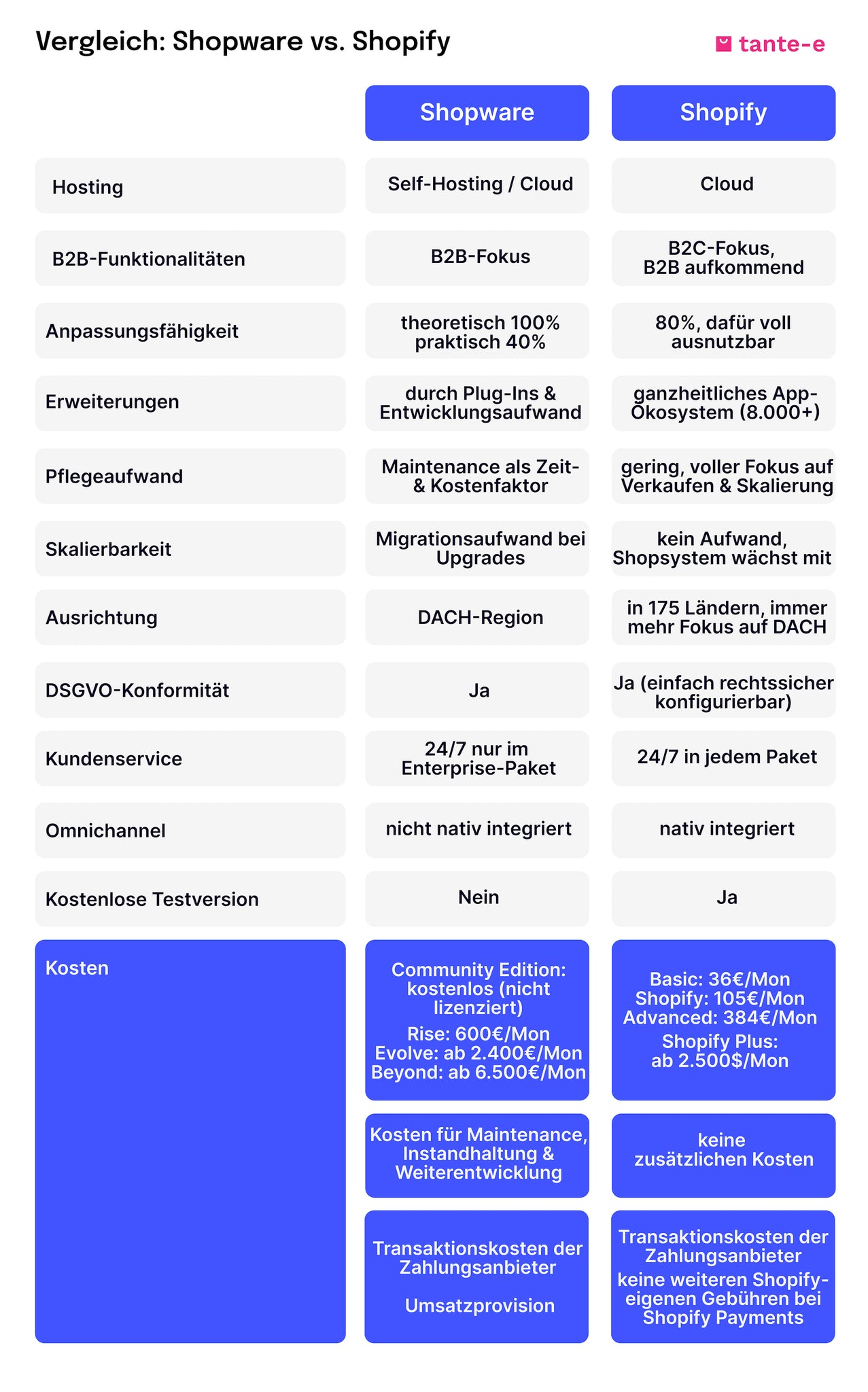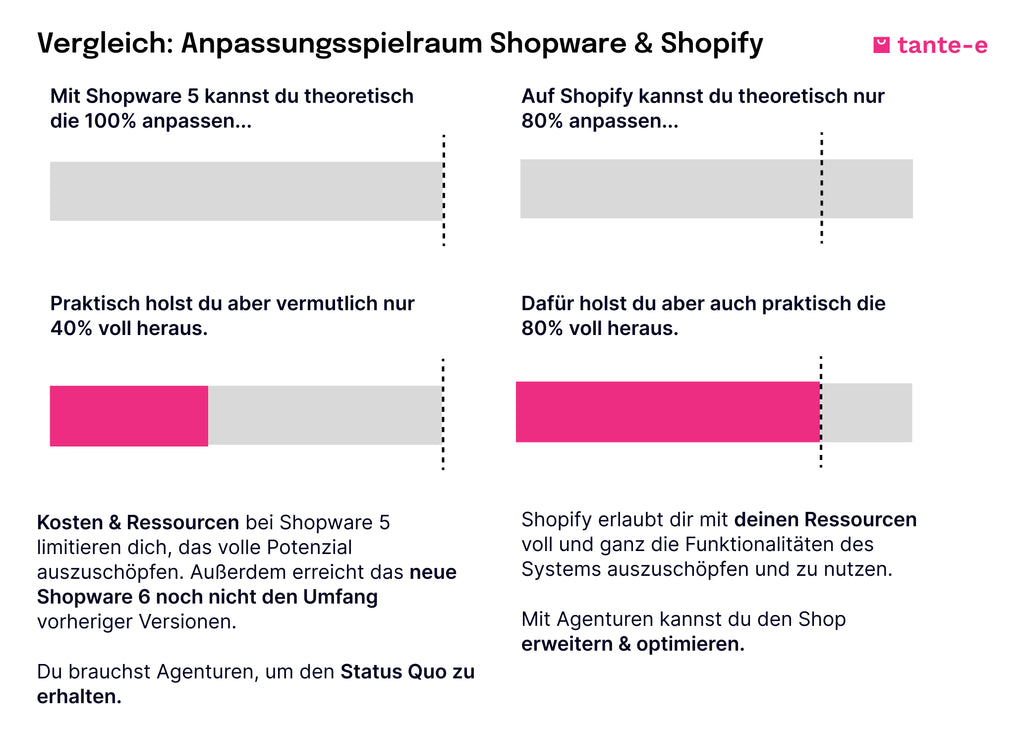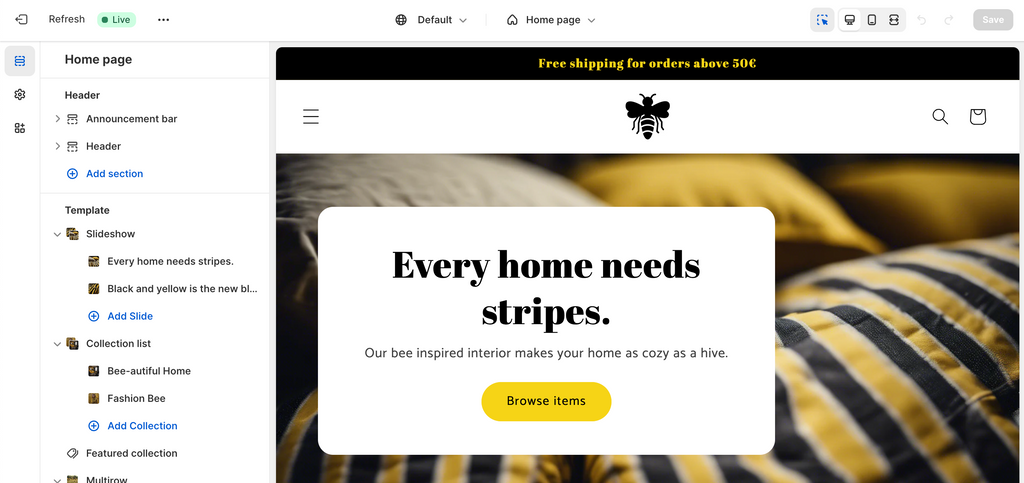Are you unsure whether Shopware or Shopify is the ideal shop system for your online store? Both platforms are widely used in e-commerce. However, they each have their own strengths and may be a better fit for you depending on your business model.
We experience the importance of a well-considered decision in our daily agency work: Retailers often choose a system only to later discover that it doesn't suit their business and a complex migration is necessary.
With our guide, you'll be on the safe side right from the start. E-commerce expert Adrian offers a comprehensive comparison of Shopware and Shopify. What are the feature differences, and which system is more cost-effective? Our criteria will also help you determine when the time is right to switch.
Before we begin, a quick disclaimer: There are many different perspectives on the topic of Shopify vs. Shopware. It's therefore crucial to understand who is expressing these opinions and for what reasons. In our article, we strive for a neutral comparison, but we want to disclose that we are a Shopify agency and therefore naturally have a preference.

- What is Shopify?
- What is Shopware?
-
Shopware or Shopify? 13 key differences
- OnPrem/Cloud vs. Cloud
- B2B focus vs. emerging B2B features
- Full adaptability vs. high user-friendliness
- More cumbersome design vs. flexible storytelling in the storefront
- Individualization thanks to open source vs. rich app ecosystem
- Maintenance vs. further development
- Continuous vs. low maintenance
- Migration effort vs. scalability
- Local focus vs. international orientation
- Limited customer service vs. free 24/7 support
- Traditional vs. dynamic community
- External vs. native integration of omnichannel
- No trial vs. free trial
- Cost comparison
- Conclusion: The decision between the shop systems
1. What is Shopify?
Shopify is a leading cloud-based e-commerce system. It enables retailers to easily create and manage an online store without any programming knowledge. Shopify handles hosting and provides a professional IT infrastructure.
4.8 million online stores in 175 countries are powered by Shopify, including international brands like Pepsi, Fenty Beauty, and Gymshark, as well as German brands like SNOCKS, Hey Marly, and PURELEI. We feature more Shopify examples in our blog.
Get started on Shopify - with our guides & checklists 🚀
2. What is Shopware?
Shopware is a leading, modular system for creating and managing online shops. Thanks to its open-source software, Shopware is particularly known for its extensive customization options.
Shopware offers both self-hosting and cloud hosting. The latter requires Shopware 6, introduced in 2019. Support for earlier versions ends in July 2024.
More than 100,000 online retailers in Germany, Austria, and Switzerland use Shopware. These include well-known brands such as Melitta, Schwan-STABILO, Fleurop, and Springlane.
3. Shopify vs. Shopware? The key differences

a. Self-Hosting / Cloud vs. Cloud
A reliable server is essential for the optimal operation of your online shop. This is where significant differences between Shopware and Shopify become apparent.
Shopify is entirely cloud-based. Once you create your store, you automatically use the platform's outsourced servers, meaning you don't have to worry about hosting yourself. Shopify provides you with a professional, proven IT infrastructure.
Automatic updates and maintenance save you additional effort and costs. Furthermore, with an impressive 99.99% uptime, Shopify ensures stable performance even during peak times.
Shopware, on the other hand, specializes primarily in on-premise hosting. This means you host your shop yourself or through another service provider. You have complete control, but this comes with a corresponding financial and time investment. The availability of your online shop also depends on the stability of your own servers.
Shopware 6 introduced a cloud-based solution alongside self-hosting for the first time. However, the platform's strengths remain clearly on-premises. The cloud version of Shopware is currently still relatively unpopular, and merchants report bugs and missing features. In contrast, Shopify was developed from the ground up as a flexible cloud system.
If you have the capacity for self-hosting and plan to operate your website on your own servers anyway, we recommend Shopware. Shopify, on the other hand, offers a more reliable cloud solution with no additional effort.
b. B2B focus vs. emerging B2B functions
From the beginning, Shopify focused heavily on merchants selling to end customers, thus operating in the B2C segment. However, more recently, Shopify recognized the increased potential of B2B and expanded its features for business-to-business commerce.
Features include customized customer segmentation and B2B-focused pricing. The platform now includes the most important B2B functions. However, we currently advise against using Shopify for purely B2B shops with particularly complex requirements. However, we expect significant further development in the coming years.
Shopware, on the other hand, serves both the B2C and B2B sectors equally. Here, the software offers extensive features for customizing content, prices, and products, for example, via the integrated Rule Builder. In our opinion, Shopware is currently the better choice for high-demand sales to business customers.
B2B features are only included in the Enterprise packages of Shopware and Shopify (Shopify Plus). Learn more about Shopify Plus in our guide.
c. Full adaptability vs. high usability
As an open-source platform, Shopware offers open access to its source code. This theoretically allows for a wide range of extensions. In practice, however, you won't get very far without advanced IT knowledge.
If you don't have any programming skills but still want special customizations, sooner or later you will have to work with an agency or experts to expand your shop.
The customization options also vary between the individual Shopware versions. While Shopware 5 offers 100% customization options, you won't be able to fully utilize them.
The graphic illustrates the problem:

In addition, in conversations with retailers, we repeatedly hear that former Shopware 5 users are dissatisfied after switching to Shopware 6. The reason: They can't find familiar features and complain that the current version doesn't meet the standards of Shopware 5.
Unlike Shopware, Shopify doesn't publish its source code and places greater restrictions on customization. A well-known example is the checkout, which can only be fully configured in the most expensive Enterprise package.
You can take full advantage of the customization options allowed by Shopify, without any coding knowledge or dependence on external support.
d. More complicated design vs. flexible storytelling
In practice, we often see how enthusiastic former Shopware merchants are about Shopify's comprehensive storefront design options. The powerful theme editor allows you to easily customize new pages using drag & drop, similar to a landing page builder.
This allows you to create product pages that perfectly match your brand identity and easily enrich them with custom sections to further highlight the unique features of your products. You can also easily configure category pages or information pages like "About Us" to bring your brand to life even more.

In our view, this is one of the main reasons why Shopify merchants value the platform so much: It offers a comprehensive set of tools for intuitive, fast, and customizable store building, perfectly tailored to the needs of your brand.
e. Individualization thanks to open source vs. rich app ecosystem
With over 8,000 available extensions, Shopify offers the largest app ecosystem in e-commerce. You can implement virtually any desired functionality through the integration of professional apps.
This is also a special unique selling point of Shopify: In our view, the seamless interaction, synchronization and complementation of the apps with each other are unique for the platform.
Whether it's accounting, product reviews, shipping, returns, or customer support, the Shopify App Store doesn't just offer one app for the desired function. Instead, you have a wide selection and can choose exactly the extension that best fits your online store.
Many developers now prioritize a Shopify-first approach, which is why the ecosystem is continuously growing.

But be careful: Not all Shopify apps are GDPR-compliant, due to the company's Canadian roots. However, in recent years, app developers have been focusing more on the European market. Ultimately, you always have control over which apps you add to your online store.
Which Shopify apps do we recommend for getting started? Our experts' tips
Shopware's plugins are often developed for the German market and ensure maximum legal compliance. However, with 3,000 available extensions, Shopware 6 offers a significantly smaller selection than Shopify. While you'll also find extensions for the most important functions, your choice is significantly more limited.
Many of the most popular Shopify extensions, such as Klaviyo for retention marketing or Reviews.io for customer reviews, are also available as plugins for Shopware. However, they don't offer the same in-depth synchronization options as for Shopify.
With Shopify, thanks to the seamless integration of apps, you can precisely and intuitively assemble the functionality your online store needs. Customizations to Shopware are naturally possible thanks to its open-source approach, but often require additional developer resources.
f. Maintenance vs. further development
Due to Shopware's on-premise focus, server maintenance is your responsibility. Many companies work with agencies that handle the technical implementation.
With Shopify, however, no additional resources are required for maintenance. Even with the cheapest package, you have access to the platform's powerful servers, trusted by even the biggest brands. Shopify is continuously working on improvements and releasing new features and interfaces at a rapid pace. Since updates are automated, your focus is entirely on developing your business.
From our experience as an agency, we can also report that technical issues and maintenance are not a concern for our Shopify clients. Rather, we support them in taking their online store to the next level, rather than simply maintaining the status quo.
In our blog, we let different brands have their say and talk about their experiences with Shopify .
g. Continuous vs. low maintenance
Shopware offers extensive customization options for every area of your online store. However, these come at a price: We often hear that people with little technical knowledge feel overwhelmed by the extensive Shopware backend, especially by features that are included by default but aren't necessarily needed.
Shopify, on the other hand, focuses on the essentials. You can add additional features to suit your individual needs via apps. Operating and maintaining your online shop takes just a few clicks and is accessible to everyone. Whether you're a student intern or a new team member, Shopify is quick to learn and requires little maintenance.
With Shopify, you can set up your store in no time and develop it independently. Our experience shows that with Shopware, progress is difficult without the support of external agencies and ongoing investment. Shopify, on the other hand, offers an efficient way of working with minimal effort, allowing you to optimize and expand your store yourself.
h. Migration effort vs. scalability
For us, this is definitely one of the key features of Shopify: The software grows along with the needs of your brand and is therefore suitable for companies of any size.
Beginners can start with the cheapest package and upgrade to a higher plan flexibly and easily as sales increase. With Shopify, a complex system change or relaunch of your store is never necessary.
Unfortunately, we're currently experiencing the opposite with Shopware: The Shopware 6 version, introduced in 2019, differs significantly from previous versions. Upgrading is therefore often difficult. Many retailers are resorting to costly external support to migrate to the latest version. Particularly difficult: Support for Shopware 5 ended in July 2024.
Many retailers also report that Shopware 6 hasn't yet reached the stability and feature diversity of its predecessors. This is where Shopify clearly stands out with its well-thought-out concept for upgrading and downgrading, as well as seamless switching between plans.
i. Local focus vs. international orientation
When deciding between Shopify and Shopware, you should also consider the local focus. Shopware was developed in Germany, making it a 100% secure choice when it comes to data protection and GDPR. Well-known brands such as Melitta, Schwan-STABILO, Fleurop, and Springlane trust Shopware.
As a Canadian company, Shopify originally focused heavily on the North American market. However, in recent years, the platform has made significant strides in localizing itself for the German-speaking market. This primarily concerns compliance with legal requirements. International brands such as Fenty Beauty, Pepsi, and Gymshark, as well as brands from the DACH region (SNOCKS, Hey Marly, PURELEI), rely on Shopify.
Find out how other shop systems perform in our comprehensive e-commerce provider comparison .
Just like Shopware, Shopify can be set up to be fully GDPR-compliant, thanks in part to useful apps and the easy addition of legal texts.
Contrary to many claims, even large companies with strict data protection requirements, such as Beurer, now rely on Shopify.
Both Shopware and Shopify integrate similar features for international commerce, including multi-currency and multilingual support. Shopware's distribution is primarily focused on the DACH region, while Shopify is established and well-known as a commerce system in 175 countries around the globe.
j. Limited customer service vs. free 24/7 support
When critical issues and bugs occur in your online store, every second counts to avoid disgruntled customers and lost revenue. Shopify and Shopware offer different support options for this.
Shopify offers 24/7 customer service, even on its cheapest plan. The support team is available 24/7 via chat, email, or phone, ensuring continuous support in case of emergencies.
Shopware, on the other hand, only includes 24/7 support in the most expensive plan. For all other Shopware packages, customer service is limited to set business hours.
Your online store, on the other hand, is open 24/7. Since customers can shop at any time and problems can arise, we see Shopify's guaranteed 24/7 support as a clear advantage over Shopware.
k. Traditional vs. dynamic community
Due to their popularity, both Shopware and Shopify boast large communities. You can expect to find helpful support for any issue in the relevant forums. However, in our experience, the characteristics of the communities differ significantly.
Shopware is backed by a more traditional community. Imagine a group of experienced retailers, partners, and agencies who have been in the business for years. Their primary concern is maintaining proven methods. Their primary focus is on the German-speaking market.
Shopify, on the other hand, encompasses a far-reaching, global network with a diverse range of developers and supporters around the globe. The community is fresh, agile, and embraces change.
But not only internationally, but also within the German-speaking Shopify community, there is a lively exchange. The best example is the events and webinars hosted by Merchant Inspiration . Shopify merchants and experts meet regularly to discuss news and developments.
l. External vs. native integration of omnichannel
Shopify clearly puts merchants first and understands that your biggest investment lies in selling and promoting your products. Therefore, even the most affordable package includes extensive native integrations with marketplaces (e.g., Amazon & eBay) and social media channels (e.g., Instagram, TikTok, Facebook, & YouTube). However, one of Shopify's greatest strengths over Shopware is the integrated Shopify POS.
The Shopify POS (point of sale) is an advanced point-of-sale system that seamlessly combines digital and physical sales channels. Whether you sell online or offline (e.g., in brick-and-mortar stores or at trade shows and festivals), you manage all sales channels centrally via the Shopify backend, offering customers a cross-channel experience.
You can learn more about Shopify POS in our detailed guide.
m. No trial vs. free trial
Choosing a shop system should be carefully considered. It's all the more helpful to be able to try out the software without obligation before purchasing.
Shopify includes a 3-day free trial. You don't need to enter any payment details, so you can get to know the system at your leisure. For example, you can build your online store, add products, and familiarize yourself with its key features.
After the trial period, you can use Shopify for three months without restrictions for €1 each. This gives you plenty of time to evaluate whether Shopify meets your expectations without taking a significant financial risk.
With Shopware, however, you can schedule a demo to gain a deeper understanding of the software. Our staff will guide you through the shop system and answer any questions you may have in a personal conversation. However, if you want to try out the features of the licensed version of Shopware, you'll have to purchase it at full price.
4. Costs of Shopware and Shopify in comparison
It is probably the most important question when deciding between Shopware and Shopify: Which shop system is cheaper?
We give you a detailed overview of the current plans for Shopware and Shopify, including other relevant cost factors.
a. Prices Shopware
| Community Edition (unlicensed) | For free | For individuals and smaller projects, especially interesting for hobbyists and developers (receives only software without support or hosting) |
| Rise | 600€/month | For small and medium-sized enterprises |
| Evolve | from 2,400€/month (individual offer) | For larger companies |
| Beyond | from 6,500€/month (individual offer) | Enterprise Edition of Shopware with B2B requirements |
All licensed editions overlap in their basic functionality, but differ in specific features and specializations, making them suitable for different types of businesses to varying degrees.
What's particularly striking is that, in our experience, the entry-level price of €600 per month is very high for small businesses and individuals. While Shopware offers a free Community Edition, it doesn't include any professional support and requires your own server. Users should therefore be technically savvy to use this version effectively.
Are there additional costs for Shopware?
If you choose self-hosting with Shopware, you'll be responsible for your server's operating costs and the system's maintenance. Continuing to develop and scale your business requires ongoing investment.
If you choose the cloud version of Shopware, these tasks are eliminated. However, depending on the plan you choose, you will pay a commission to Shopware for each purchase made. In addition, standard transaction fees apply, which vary depending on the payment provider you choose.
b. Shopify Prices
| Shopify Basic | 36€/Monthly | Entry-level plan for small businesses and individuals |
| Shopify | 105€/Month | Rapidly growing small and medium-sized enterprises |
| Shopify Advanced | 384€/Monthly | Large companies |
| Shopify Plus | From $2,500/month (custom offer) | Shopify Enterprise Edition with B2B requirements |
The same applies to Shopify: Each plan includes the most important features for building an optimal online store. The differences lie more in the details, such as possible automation or the depth of reporting.
You can find a comprehensive guide to Shopify's pricing plans with further decision-making assistance in our blog.
Are there any additional costs with Shopify?
Shopify's monthly fees include all server costs and maintenance. Furthermore, you don't pay any additional fees for updates and maintenance. Shopify handles all of this for you.
Shopify also has two types of transaction fees: First, there are the usual fees charged by external payment providers, such as credit card payments or Klarna invoices. These vary depending on the payment method used and the Shopify plan selected. You can find an overview in the infographic.

Shopify also charges a separate fee for each sale. The amount depends on the plan you choose. The best part: This fee is waived if you activate the integrated payment method Shopify Payments.
Since Shopify Payments includes the most popular payment methods without dependence on external providers, we recommend using this service anyway.
With Shopify Payments, you can significantly reduce your additional costs. Learn everything you need to know about the payment provider in our guide.
c. Is Shopware or Shopify cheaper?
Shopify's pricing models are more affordable than Shopware's licensed packages and are particularly attractive for small businesses. A significant advantage is the savings in additional transaction fees when using Shopify Payments. Furthermore, there are no additional costs for server maintenance or working with agencies to expand the online shop.
If you're technically savvy or content with basic features without additional support, Shopware's free Community Edition might be the perfect deal for you. However, this requires you to operate and maintain your own servers.
Due to the high costs, we generally recommend Shopify for small and medium-sized businesses. Both platforms are suitable for larger companies, although Shopify offers better scalability here, too.
5. Conclusion: The decision between the shop systems
After this detailed comparison, it's time for our conclusion. One thing is certain: Both systems offer a powerful and flexible foundation for your online shop. But which should you choose?
To help you make the ultimate choice, we have compiled a checklist of the most important criteria you should consider.
a. Who is Shopware suitable for? (Checklist)
If the following statements apply to you, we recommend using Shopware:
- You want to run your own online shop on-premise on your own servers, including maintenance and upkeep.
- You need 100% flexibility to customize your online shop and a customized checkout is important to you.
- You have large budgets and resources to work with an agency.
- You have complex requirements for a pure B2B shop.
- Your focus is mainly on the German-speaking region.
- You have an extremely large product variety and are reaching your limits with Shopify's three-dimensional variant limit.
- You need maximum control over your link structure.
- As a hobbyist/developer, the free community version is sufficient for you without professional support and hosting.
- If you're already a medium-sized or large company, the cost starting at €600 per month for the cheapest package will be worthwhile for you.
b. Who is Shopify suitable for? (Checklist)
If these features apply better to you, we recommend Shopify instead of Shopware:
- You want to rely on reliable cloud hosting and not spend resources on servers, updates, and maintenance.
- In addition to flexible customization options, user-friendly handling is particularly important to you.
- You value a holistic customer experience that offers your customers a unique experience at every touchpoint.
- You want to reach your customers more effectively and increase your retention by using state-of-the-art tools that share data and interact seamlessly with each other.
- Your focus is B2C, possibly with occasional B2B requirements.
- You are looking for a scalable shop system that grows with your needs and can be easily upgraded – for every stage of growth, from individuals and small businesses to medium-sized and large companies.
- Storytelling and conveying emotions are especially important for your brand. Therefore, you need a storefront that optimally presents your product brand and brand identity and offers you the greatest possible flexibility.
- You want to sell not only online but also offline and are looking for a shop system with comprehensive, native POS functionalities.
- You want to test the shop system thoroughly beforehand without any costs or restrictions.


